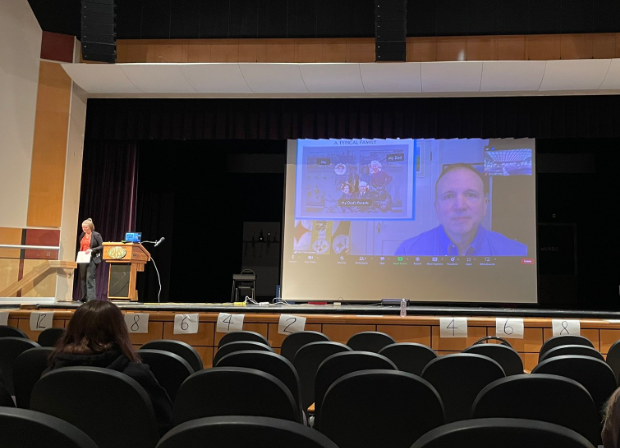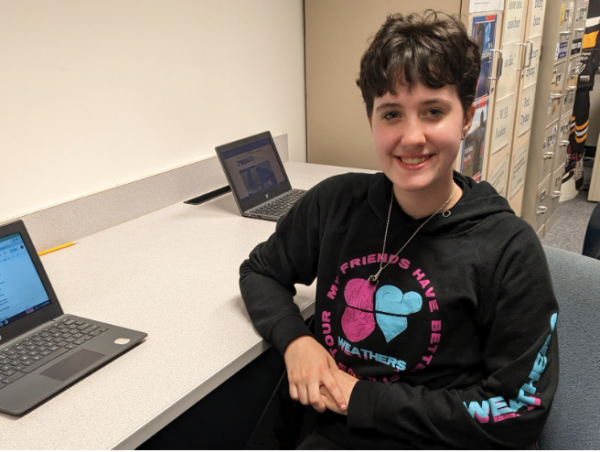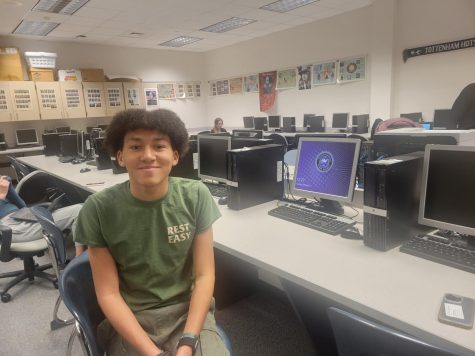Holocaust generational speaker shares family’s story
Holocaust survivor’s son Dan Ottenheimer presents to students via Zoom in the BHS auditorium.
March 14, 2023
When student teacher Erin Wrisley was teaching Night by Elie Wiesel, a book about the Holocaust, she and English teacher Krystal Schulte noticed an emotional distance between the tragedy and their students.
“We had students who thought the Holocaust wasn’t real in the beginning, and that was the deciding moment for Erin,” Schulte said.
Wrisley reached out to the Holocaust Center of Pittsburgh, who placed her in contact with Dan Ottenheimer, the son of a Holocaust survivor. Ottenheimer spoke to Baldwin students virtually in the auditorium on Monday.
During the presentation, he shared the story of his father, Fritz Ottenheimer, as a Jewish child in Nazi Germany, as well as Fritz’s affected family members. These experiences ranged from their home life through the impact the Holocaust made on the world as a whole.
Soon after Hitler rose to power, German stormtroopers stood guard over Jewish-owned businesses. They hoped by doing this it would scare customers, making the Jewish shop owners go out of business.
Ottenheimer’s grandfather owned a clothing shop and was affected by this situation. He then proceeded to display the medals he earned fighting for Germany in World War I.
However, the stormtroopers did not care about his service because he was marked for being Jewish. The community however, went out of their way to support him.
“Another bystander showed up, then a second, and then a third,” Ottenheimer said. “Each of them tried to explain to the stormtrooper that what he was doing was wrong.”
Unfortunately, the early community support was short-lived in the fight against anti-semitism as the Nazi Party gained more power.
One night, Ottenheimer’s father heard an explosion. When he looked out the window, his synagogue was in flames. This was Nov. 10, 1938: Kristallnacht.
“Jewish stores throughout Germany were ransacked,” Ottenheimer said. “The display windows were all broken. That is why it came to be known as the Night of Broken Glass.”
The following day, Ottenheimer’s grandfather was taken to a labor camp by Nazi secret police, the Gestapo. There, he faced inhumane conditions. The Jewish citizens in the camp were barely clothed in the midst of winter, fed little food, denied care for illness, and forced into working for the Nazi military.
This was in the time before the labor camps became death camps. Many people died due to the conditions, but the death toll did not reach the catastrophic levels that would be reached later by the systematic genocide.
“After six weeks, my grandfather was released,” Ottenheimer said. “One day without warning he just showed up again at my dad’s apartment door. He was desperately sick. Very, very ill. He had lost a tremendous amount of weight. He was mostly skin and bones, but he was alive.”
After undergoing multiple-year long visa application reviews, the Ottenheimer family managed to immigrate to the United States through a sponsorship by extended family. They originally applied for a visa in 1936 but were only accepted to the United States in 1939.
And so the Ottenheimer family survived. Fritz Ottenheimer went on to serve in the U.S. military and help in German reconstruction. Decades later, he went on to write his memoirs and share his story to Pittsburgh students. After his father’s death, Dan Ottenheimer began to speak as a legacy speaker.
“When you hear these stories, you need to remember they are repeated over and over again,” Ottenheimer said. “I hope that by telling these stories that we can prevent this from happening to anyone else ever again.”
Students were impressed by the presentation.
“I think it is interesting to think about how sometimes people wouldn’t recognize that other people are just people,” senior Samuel Petrovich said.
Junior Sean Campbell agreed.
“Since I’m not Jewish, this really helped me understand what people were going through back then in Germany,” Campbell said.
Wrisley, the student teacher, hopes the message got through.
“As some of the students were walking out, they were saying things like ‘Oh, I was actually more interested in that than I thought,’ so I hope they were able to take a lot from it,” Wrisley said. “I hope it was as eye-opening and beneficial to the students as it was to me.”






